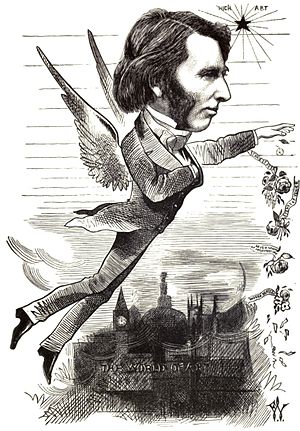| English: John Ruskin. Art criticism. from Cartoon portraits and biographical sketches of men of the day (Photo credit: Wikipedia) |
My point is, beside some purposely personal attacks by "mean-spirit" persons , I found the frequent unpleasant "fights" all over Chinese internet was due to the confusion of "suggestion" and "personal judgement". It seems to me, that because most Chinese people grew up by "personal judgement" - from parents to school education, many Chinese people simply do not have a clear understanding on what is "personal judgement", so they (we) easily throw it onto others, despite of their innocent motive (as matter of fact, "personal judgement" as a term is yet to be invented in Chinese). And because they grew up under severe criticism, they easily developed a perfectionist personality, which leads them to be over criticizing to themselves and others. Among Chinese intellectuals, it seems to be a "common sense" that no one can really speak out about anything unless he/she is an expert in the field to which his/her topic related. Thus if they heard anything unorthodox, they tend to use harsh words to scorn, even silent the speakers.
This, I believe, is one of major reasons why there is no freedom of speech in China, both politically or intellectually. Of course, the social system is "villain", but the system is just the "exterior" cause, the "interior" one is the rigid mindset of all population.
Back to my view on "criticism", I believe that first of all, any "criticism" or "suggestion" should be based on equal respect, represented in a "personal" fashion, such as "it's just my opinion", etc. And the art of criticism, I believe is not about "criticizing" at all, but about freedom of speech. In other words, when we bring up suggestions, the true motive is to presenting our own ideas about the subjects, to share our ideas with others, not about letting others accept our ideas. (I myself also need some improvement on this manner. I am still a Chinese by blood:-))
I also touched a little on debating. Speak to myself, I enjoy it only because I enjoy logic thinking, so the process of debating, usually is a process that I try to convince myself, not my opponents.


You raise some interesting thoughts and questions here, Yunyi. I've personally never enjoyed debating, mostly because all too often, it feels like arguing. I suppose skilled debaters leave emotions out of the picture. Since debates are really matters of opinion, how can there be winners or losers? It's interesting to hear you talk about Chinese culture, especially perfectionism driven by criticism. When did that happen in the culture? Admittedly, I know very little about it, but I have read the teachings of Lao Tzu which de-emphasizes the importance of holding opinions.
ReplyDeleteOne should always give all due respect. In my opinion, respect doesn't have to be earned—it should be the default position in human interactions—but respect can be lost.
ReplyDeleteRe stating "it's just my opinion: Not everything is a matter of opinion. Sometimes it is a matter of verifiable fact. For example, if someone says "two plus two equals five" then, in my opinion, it is not necessary to state that it is only your opinion that it equals four. That's a trivial example, but the point is if you are confident of your facts and they are, indeed, facts not conjectures, then it is OK to respectfully state them as facts, not opinions.
But, even then, respect is paramount. Otherwise, the debate will degenerate into a shouting match—or the written equivalent— and shouting doesn't advance a debate. It just induces headaches and bad will.
@Kris,
ReplyDeleteI happen to enjoy debate and I think I have a fare ability to separate reasoning from feeling.
As I said in BC, Lao Tzu never was a mainstream figure in Chinese tradition. His influence is more on artistic side of culture.
@Joel, "respect is paramount", absolutely!
Hi Yunyi. Interesting that you should choose to illustrate this post with a picture of John Ruskin. This is what Ruskin had to say about Whistler's painting Nocturne in Black and Gold:
ReplyDelete"I have seen, and heard, much of Cockney impudence before now; but never expected to hear a coxcomb ask two hundred guineas for flinging a pot of paint in the public's face."
This seems to be a perfect illustration of the points you raise in this post. Art and literary criticism can be a brutal business. Incidentally, Whistler sued Ruskin for libel.
Thanks Dennis. I actually did not know this anecdote. It seems relevant.
ReplyDeleteHow much I enjoy debating centers more around the person I'm debating than with the content. You're right. It should be based on equal respect. If someone is just going to barrel over me and not listen to my viewpoint because they don't agree, what's the point?
ReplyDelete@Janene,
ReplyDeletethanks! interesting view. you are right, we don't want to discussing much with ones who hold giant ego.